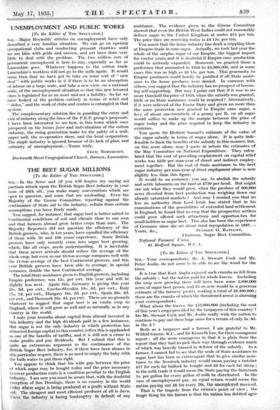UNEMPLOYMENT AND PUBLIC WORKS
[To the Editor of THE SPECTATOR.] Sia,—Major, Reynolds' articles on unemployment have only described a very familiar situation. We can go on opening occupational clubs and conducting pleasant charities until we are blue with pride and success, _and yet have done very little to deal with the problem. The two million core of permanent unemployed is here to stay, especially as far as Lancashire goes. Whatever happens to the cotton trade Lancashire's workless will not go to the mills again. It would seem then that we have got to take on some sort of " new deal " with public works in it if there is to be an absorption of labour on a large scale, and take a new view, on a national scale, of the unemployment situation so that this new leisured class is legislated for as an asset and not a liability. So far we have looked at the problem entirely in terms of relief and ", doles," and the work of clubs and centres is entangled in that system. i The complementary solution lies in guarding the entry and exit of industry along the lines of the P.E.P. group's proposals. I have been interested to see how, in this town which once prospered on the laissez faire and individualism of the cotton industry, the rising generation make for the safety of a wall- paper mill, the co-operative store, and the local corporation. The staple industry is ignored because of its lack of plan, and certainty of unemployment.—Yours truly,
CECIL Nonrncorr.
Duckworth Street Congregational Church, Damen, Lancashire.










































 Previous page
Previous page